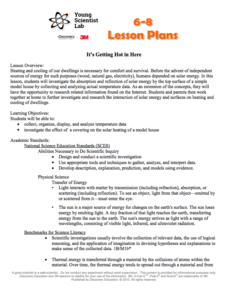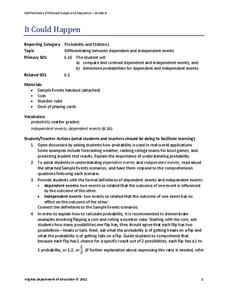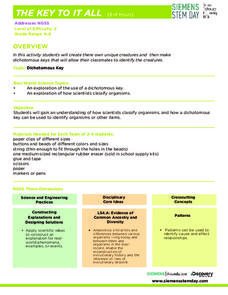New South Wales Department of Education
Is it Alive?
Interestingly enough, movement is not a characteristic of living things. The first activity in a series of 20 introduces learners to the concepts of living versus non-living things and then focuses on biologists and what they study....
Discovery Education
Make it all Better!
Discover how innovations can help your school and community. In the three-part STEM lesson plan, scholars learn the meaning of innovation and brainstorm innovations in their schools. They identify issues in their communities and think of...
Discovery Education
Cushion It!
Sugar cubes, collide! Groups design protection systems using bubble wrap to protect sugar cubes from being destroyed by falling batteries in the STEM lesson. They consider how the experiment relates to collisions in real-world...
Discovery Education
It's Getting Hot in Here
Class members engage in a STEM experiment and investigate how materials affect heating in a house by creating models of houses and using different top surface materials. They record the temperature inside the models and consider what the...
Project WET Foundation
The Blue Planet
What a neat interactive that interacts with the amount of water on Earth's surface. It begins with a brief audio introduction of the Blue Planet and how it got its name. Then, users click on the activity to play a game that calculates...
National Wildlife Federation
It's All in the Name: Weather Versus Climate
What goes up when rain comes down? An umbrella! Activity eight in the series of 12 explores weather and climate. In pairs, participants analyze maps, watch a short video, create a weather forecast, and complete a reading to determine the...
Read Works
Famous Inventors — Zip it Up
Explore the invention of the zipper with a 10-question reading comprehension worksheet that challenges scholars to show what they know about an informational text's details and vocabulary.
American Physiological Society
Did I Observe it or Infer it?
Take the mystery out of inquiry! When young scientists learn to use their keen powers of observation to make smart inferences about a situation, they are well on their way to understanding what the scientific method is all about. Using...
Virginia Department of Education
It Could Happen
Understanding of probability will probably increase with the use of a refined resource. Pupils learn to distinguish between dependent and independent events as they calculate the probabilities of these types of events in various situations.
K12 Reader
Circle It! Indirect Objects
If you give this worksheet to your class, make sure you know where the indirect object is! Young grammarians work on their grammar skills with a series of ten sentences, each with an indirect object ready for pupils to circle.
Science Matters
Blubber Gloves: It’s All About Insulation
Instill the concept of adaptation with the help of Blubber Gloves—ziplock bags, shortening, and duct tape. Scholars discuss how animals and plants keep warm in polar regions, record their predictions, and try on their Blubber Gloves to...
Teach Engineering
Let's Get it There Fast
Are planes the best shipping method? Using maps, pupils determine the fastest mode of transportation between two cities. Given a list of items to ship, groups decide the best shipping method to finish the 18th segment of a 22-part unit.
Houghton Mifflin Harcourt
Nature: Friend and Foe: Extra Support Lessons (Theme 6)
Breaking down words into syllables has two benefits: it improves vocabulary and it improves understanding of a text. The third and final resource in a series of materials designed to be used with Nature: Friend or Foe offers extra...
Stockton University Wordpress
Civil Disobedience: Is it ever ok to break the law?
As part of a study of civil disobedience, class members read excerpts from the writings of activists who were willing to break the law to protest unjust laws.
Constitutional Rights Foundation
The Cold War: How Did It Start? How Did It End?
What is the difference between a Cold War and a Hot War? Scholars research the beginning of the Cold War. They analyze diary entries as well as excerpts from various events during the 45-year standoff. To finish, they prepare final...
American Statistical Association
Chunk it!
Chunking information helps you remember that information longer. A hands-on activity tests this theory by having learners collect and analyze their own data. Following their conclusions, they conduct randomization simulations to test...
Judicial Learning Center
The Constitution
Supreme Court justices debate the meaning of the US Constitution, but we expect teachers to explain it to scholars with far less training and experience. A daunting task for sure, but it's not insurmountable with resources that simplify...
Discovery Education
The Key to It All
Which characteristics make organisms unique? Dichotomous keys simplify the process of classifying organisms by focusing on these unique characteristics. Young scholars learn how to use the dichotomous key flow chart by creating their own...
Learning Games Lab
Understanding Water Activity
How does water activity play a role in food spoilage? First, the learners think about which types of foods would be best to take on a backpacking trip based on the water activity of different foods. It then walks through why water...
Missouri Department of Elementary
Life … Bring It On!
To conclude the study of coping skills, class members create a collage that identifies and celebrates their strengths that support their ability to make good decisions.
Lions Clubs International Foundation
Mindful Self-Awareness Exercise: Identifying Feelings
Young scholars identify feelings through facial expressions and body language. Learners listen for a feeling word, then act it out and discuss how they portrayed it.
Overcoming Obstacles
Listening
Young scholars boost communication skills with a lesson that explores what it looks like to listen with the whole body. Through modeling and practice, pupils observe what it looks like and then practice. A friendly game of "Simon Says"...
Penguin Books
A Teacher's Guide to The Omnivore’s Dilemma: A Natural History of Four Meals by Michael Pollan
"What should we have for dinner?" "What am I eating?" "Where did it come from?" These three questions are at the heart of Michael Pollan's The Omnivore's Dilemma: A Natural History of Four Meals. Pollan's book provides some very...
Curated OER
Tastes Great-- Is It Good for You?
Students use the food guide pyramid established by the U.S. Department of Agriculture to evaluate the nutritional value of their favorite foods.
Other popular searches
- Call It Courage
- A Child Called It
- "Pay It Forward" Movie
- Pay It Forward
- Bend It Like Beckham
- Pay It Forward" Movie
- Mark Twain Roughing It
- Pay It Forward Movie
- Making It Balance
- As You Like It
- It Looked Like Spilt Milk
- Its a Wonderful Life

























